‘I was in prison at 20 - and a music executive by 28’
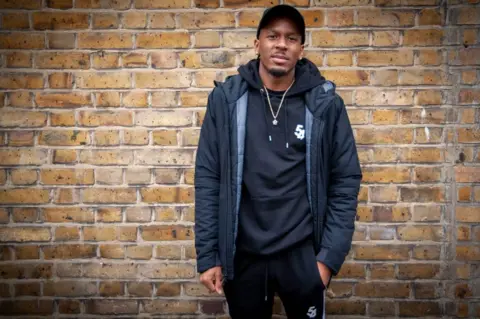 BBC
BBC
As he faced a long jail sentence, the life Niyah Smith had once dreamed of looked impossible. But the chance to turn his fortunes around came sooner than he expected.
On a warm London afternoon, a black Audi A3 cruised slowly along a ring road. Four young men were inside, and they'd all just travelled to Birmingham and back. From his back seat, a 20-year-old named Niyah Smith looked up at the rear-view mirror and noticed a police car approaching.
The friend sitting directly in front of Niyah had spotted it too. "Everyone just relax," he told the other passengers. The date was 19 June 2012.
Apart from a few minor driving offences, Niyah had never been in trouble with the law. He had grown up in a tower block in Homerton, east London, at a time when the area had a reputation for violent crime and gangs, but his mother had always had higher aspirations for Niyah. At school he'd done her proud, earning good grades. He loved music and was a skilled pianist. He was at college now, working as a tennis coach to fund his studies.
The police car overtook and flashed its lights, a signal to pull over. Niyah realised all the traffic ahead had stopped too. Then, as the Audi came to a halt, he saw more police cars surrounding it and armed officers emerging from them.
They trained their guns at the Audi and ordered everyone inside to put their hands up.
As Niyah remembers it, the passenger in front of him tried to open the door, as if to escape. But officers opened the other front door and fired a Taser at him before dragging him out to the ground.
After seeing this, Niyah did as he was told. He left the car with his hands raised and was quickly handcuffed. From a grass verge, he watched as police searched the car. Soon, underneath the passenger seat, directly in front of where Niyah had been sitting, they found what they were looking for.

When Niyah first arrived at HM Prison Feltham, the young offenders' institution in west London where he would spend his time on remand, he hadn't yet processed the shock of his arrest. Inside Feltham, his disorientation would only grow more acute. With its byzantine rules and systems, its sprawling corridors and landings, it felt as though he'd entered another world.
Before he was led on to the reception wing, a prison officer ran through a list of prison regulations. Everything was new to Niyah - concepts like daily association, earning privileges. He hadn't shared a room since he was eight, when his eldest brother had moved out, but now he was told he'd have a cellmate. Niyah wondered if they'd get along, whether the other guy would snore. He kept checking his pocket for a mobile phone that wasn't there.
He wondered whether he was going to survive this.
Now he'd have plenty time to reflect on how he'd ended up in Feltham. He thought about his mother, who'd worked two jobs to support the family single-handedly, and how this had been the last thing she'd wanted for him.
It hadn't just been his academic and musical talents she'd encouraged. She'd also ensured he made the most of his gift for tennis. Until the age of 13, most of his free time was devoted to the game - honing his technique, keeping fit, travelling to tournaments across England. At his peak he was ranked in the top 100 for his age in the country. It had kept him off the streets and out of trouble.
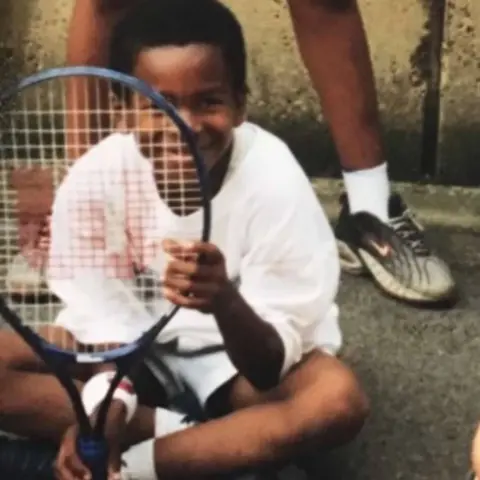 Niyah Smith
Niyah Smith
And then one day, during an illicit game of football - aspiring young tennis stars weren't meant to take risks like this - a stray tackle left him with a broken leg. This didn't just end his hopes of a tennis career, it made it impossible for him to get across the city on crutches to school every day.
He never stopped studying - he'd stay in the tower block with his books, and a tutor would come to visit - but as the fracture healed over 18 months, he gradually lost touch with his school classmates, who, like him, were generally of an academic disposition. Now he would spend more time with another group of friends, the ones he'd grown up alongside on the streets of Homerton.
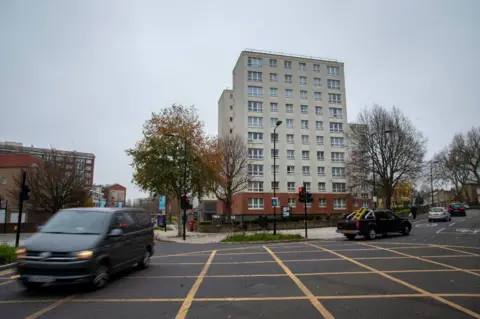
While Niyah had hardly had a privileged upbringing, these boys had had it tougher. Some had lost both parents and ended up in foster care, others had dyslexia that had never been treated and had never been encouraged to study. "Back then, it wasn't the best place to live," he says. "Every other day, someone's getting stabbed, someone's getting shot."
Niyah says he and his friends in Homerton never saw themselves as a gang, exactly. They'd hang out together in a group, go on bike rides, have rap battles in the street. They might have looked like a gang to the police patrol cars that would cruise past them, however. And as time went on, they stayed together for protection as well as company.
London's notorious postcode wars meant it wasn't a good idea to wander around on your own in case a group of kids from another area spotted you. And if they did and you got beaten up, the unwritten code dictated that you couldn't go to the police about it, you had to get your own back.
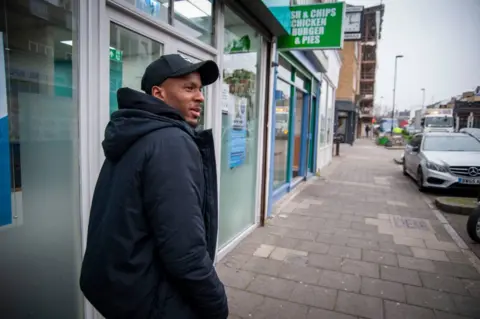
Fights grew from one-on-ones to five against five, and then the brawls would get bigger still. Some of Niyah's friends were arrested for carrying baseball bats and knives. He knew that some of them were caught up in more serious criminal activity too.
But Niyah himself had mostly stayed out of trouble. He'd won a place on a music business course at a nearby college - he'd grown up in a home where the sounds of reggae and R&B were all around, and he hoped he might make a career in the industry somehow.
Then one day one of his friends suggested a group of them drive to Birmingham and back. "Why not?" thought Niyah. He didn't have anything else on that day.

Niyah was getting used to life in Feltham. The rules were starting to make sense and he kept out of trouble. To his relief, his cellmate had turned out to be a good guy - he was a first-time inmate too, and the two of them bonded over what was a new experience for both of them. To make the most of his time inside, Niyah signed up to a series of courses: painting and decorating, carpentry, auto mechanics.
There was another course he was desperate to get a place on - a music course. Here in Feltham, incredibly, there was a state-of-the-art studio which inmates could learn how to operate. But all the places were taken. Every night, as he played table tennis or watched EastEnders, Niyah thought about how great it would be to get on it.
At least it was a distraction from his looming court appearance. That wasn't looking good for Niyah.
When they'd first met, his solicitor had turned up with a huge bundle of files. It was the case that had been assembled against him.
It turned out one of his friends in the car - the one sitting in front of him - had been under police surveillance for two years. The Audi had been tailed all the way to the Midlands and back.
After the car had been pulled over, the police had found a pair of latex gloves and a bandana wrapped around a Baikal handgun loaded with seven rounds of ammunition. The charge was possession of a firearm with intent to endanger life, and the maximum sentence was 14 years.
Niyah told the solicitor he hadn't known about the gun.
The solicitor explained that as it applied at the time, the controversial law of "joint enterprise" didn't help his case. Prosecutors said they had forensic evidence linking him to the gun, which Niyah says didn't make any sense to him - he told his lawyer he hadn't touched or even seen it.
Niyah's solicitor told him there was a possible way out - he might have a chance of being acquitted if he pinned the blame on his friend. Was he willing to do that? His family urged him to take the lawyer's advice. But Niyah felt deeply uneasy. "I said I'm not going to, because these are people that I've known forever."
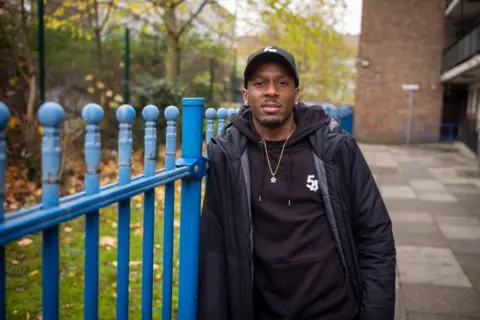
As Autumn 2012 wore on and the trial grew closer, he thought about what to do. If he went to trial, pleaded not guilty and lost, the solicitor told him he was looking at a minimum of 10 years. If he pleaded guilty, he was looking at between seven and nine.
It would be the hardest decision of his life.
And then with barely six weeks to go before the trial, Niyah received one rare glimmer of good news. He'd been accepted on to Feltham's music course.

The night before it began, Niyah barely slept. For once he was thinking not about the trial, and the next decade of his life behind bars, but about all the techniques he could master, the sounds he could create.
On the first morning of the course, Niyah noticed that some of the other prisoners saw the studio as a place to sit around and chill out, but he was there to learn.
The tutor was David Smart, an experienced sound engineer who had run his own studio in Hackney before joining the prison service. He'd taught hundreds of young inmates, but Niyah wasn't like the others.
"There was something different about him," recalls Smart. "He was just fascinated by what could be done. 'Why do you use that effect? How does that effect work?' His inquisitive nature really stood out."
The course was divided into two - sound engineering and song-writing. Niyah began learning how to record, mix and make a track sound good on the radio. He experimented with making his own beats in the studio, and recorded other inmates rapping over the top of them. There were guitars and a drum kit that he could play for the first time. When he left he could take away a CD of the music he had created. It would be proof that he could master a professional studio.
"I just wanted to learn everything," he says. "I didn't feel like I was in prison - I was waking up and going to a recording studio every day."
Then it was time to go to Wood Green Crown Court.
As he sat in the dock, Niyah's hands felt as though they were burning. Since his arrest, his hair had grown long and unkempt. His mother, his cousin and his sister were in the room too, but Niyah tried not to look at them.
Niyah had decided to plead guilty. "I have to accept that I put myself in that situation," he says. He felt he had to take responsibility for getting in the car with his friends, knowing the lifestyle they were leading. The punishment felt harsh, but he accepted he was culpable. "It was my choice not to cut them off. It was my choice to still be around them. So I have to accept my consequences."
He recalls the judge telling him how puzzled he was to see Niyah in front of him for those offences, with no previous convictions of any significance. Then the sentence was handed down: eight-and-a-half years.
It sounded like a lifetime to Niyah. With good behaviour, he might be out in four-and-a-quarter. But that felt like forever. He didn't think his girlfriend would wait all that time for him. He had to work out how to make the most of his time inside. But he still had unfinished business in Feltham.

Niyah was on his way back to his cell. Now he'd been given his sentence, he'd been told that within days he'd be taken away to another prison. It would give him just enough time to finish off the CD he was making of other prisoners rapping over the beats he'd programmed.
But when he arrived, a prison officer told him there had been a change of plan. He would be moved to another young offenders' institution, HMP Littlehey in Cambridgeshire, the next day.
Niyah pleaded with Smart to give him an hour in the studio to finish everything off. "I needed to take what I'd created with me," he says. "I was willing to go to any length to get it." But Smart had a class to teach.
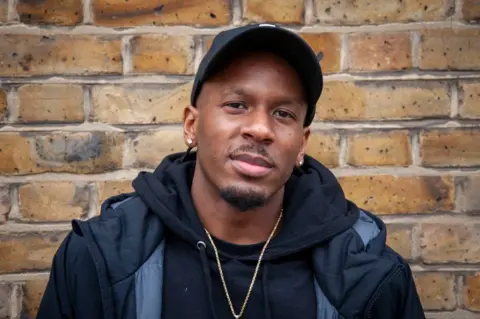
Early on his final day in Feltham, with his bags packed for the move, Niyah managed to complete his final mix. But there wasn't time for him to burn the CD - Smart would have to do it for him while Niyah was being checked out of the prison. Worn down by Niyah's pleas, Smart found another tutor to take charge of his class. "I'll be real with you - I wouldn't do this for many people but I had to do it for Niyah," says Smart.
An officer led Niyah to reception. As the final paperwork was completed, he looked around: he still couldn't see Smart. As he was about to be taken to the van that would drive him away from Feltham forever, there was still no sign.
And then suddenly the tutor appeared. "I've got it, I've got it here," he said.
As the van drove him to Littlehey, Niyah couldn't stop smiling. "I know I was going away, I know I was doing the sentence - but I was happy, because I'd left with something good," he says.

When Niyah arrived, he looked around the cell he would have to himself - there was no sharing at Littlehey. It was just before Christmas 2012. He knew how tough it would be spending it without his family.
Because he'd been convicted of such a serious charge - possession of a firearm with intent to endanger life - Niyah was classed as being at a high risk of reoffending. He was determined to prove this assessment wrong. The music he'd created had given him an impetus: he knew he could do more with his life than spend it in prison.
He signed up to every course he could - English, maths, business studies, plumbing, software. One day in the gym, he challenged a member of staff to a game of tennis. When the staff member saw how good Niyah was, he offered him a job as a gym orderly - one of the most coveted positions an inmate could hold.
By January 2014, Niyah was 21 years and 10 months old. It was time to move him to an adult prison. He spent six months at Highpoint in Suffolk and then was transferred to nearby Warren Hill, where he worked as a wing cleaner and kept his head down. By September that year he had spent two years inside. He had stayed out of trouble, hadn't got into any fights. He would now be a category D prisoner, eligible for open conditions.
When he arrived at HMP Hollesley Bay, Niyah realised how institutionalised he'd become. He wasn't used to being in a place where the doors were never locked. He'd grown accustomed to his cell door being shut behind him at 7pm each evening and a key being turned. Now he had the freedom to come and go, as long as he was back between 11pm and 7am. "Open prison took me a while to get my head around," he says.
Some other prisoners hadn't adapted well to their new-found freedom. They'd break the rules by smuggling in a phone or ordering in food: "I stayed away from all that," he says. He didn't want to throw away the progress he'd made.
But he also knew this was a foretaste of what awaited him outside prison - how easy it would be to get drawn back into a criminal environment. He studied for a Heavy Goods Vehicle licence in the hope it would offer a steady job.
It was a decision that paid off. Two weeks after he was released in 2016, he secured a job as a delivery driver with a catering company. He took night shifts so he could devote his days to breaking into the music business.

One of the first calls he made was to David Smart, his old music tutor from Feltham.
When Smart answered the phone, he was delighted to hear from Niyah - he'd he hadn't forgotten the young inmate who'd come to his studio, who'd looked overjoyed when he appeared with the CD on his last day. Smart had stopped working in Feltham, and now he was doing studio work on the outside as well as mentoring ex-prisoners. He offered Niyah regular sessions as an engineer, which he accepted with alacrity.
But Niyah had ambitions beyond the mixing desk. He realised his drive and focus might serve him better as a manager than as a producer. He immersed himself in east London's music scene - grime, R&B, pop, jazz.
 Niyah Smith
Niyah SmithWhenever he had time between shifts he'd attend gigs, or trawl YouTube and Soundcloud looking for unsigned acts. If he thought they had potential, he'd offer them his services.
One of the artists he was in touch with around this time was a young singer, songwriter and rapper called Stephanie Victoria Allen, who performed as Stefflon Don. She and Niyah went back a long way together - she was the ex-partner of one of Niyah's best friends, and Niyah and her ex-partner helped her out, booking studios, arranging photo shoots and so on.
 Niyah Smith
Niyah Smith
When it became apparent she was going to become a big star, and would sign a deal with a major record company, she moved on to a more established team: "We could only take her so far because we were fresh in the game," says Niyah.
But she didn't forget what he'd done for her. When she signed her contract with Universal Records, part of the deal was that she was given her own subsidiary label to which she could sign her own acts, 54 London. She asked Niyah to find new artists for her to consider signing.
This was an opportunity Niyah was determined not to pass up. He'd recently become a father for the first time - this was no longer just about realising his own ambitions, but providing the best possible life for his daughter.
 Niyah Smith
Niyah Smith
He organised a club night in Ilford, east London, with Steff and two other artists on the bill. He took charge of every detail - the promotion, the line-up, even the security. The venue sold out, and Niyah had passed his audition - in November 2018, she offered him a role as an artist and repertoire executive, responsible for finding and developing new talent.
For many 28-year-olds, securing a role like this would be a dream come true - for one who spent over four years in prison it was even more remarkable.
"I'll never get back the four years and nine months I was away - for me, it's about not wasting any more time," Niyah says. He knew he couldn't change his past, but hoped others might find inspiration from the way that he transcended it: "To others who are in the position I was - there is always hope."
Photos by Phil Coomes unless otherwise stated
You might also be interested in...
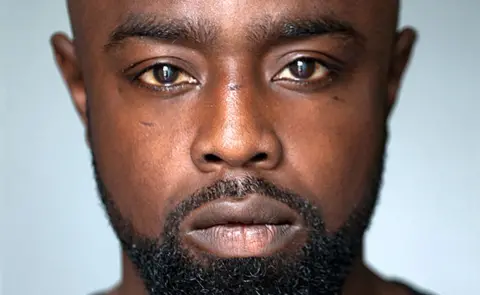 Simon Annand
Simon AnnandHe spent his early life in and out of jail - then Michael Balogun decided he wanted to study to become an actor at one of the world's most prestigious drama schools. Could this seemingly impossible ambition be the catalyst he needed to turn his life around?
